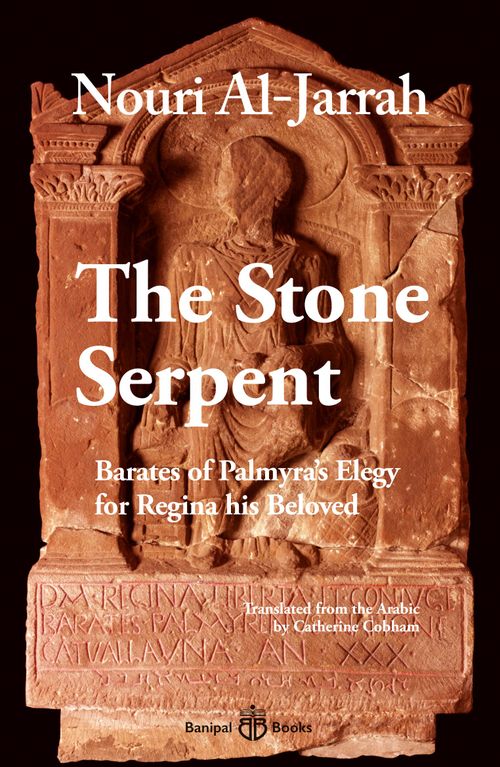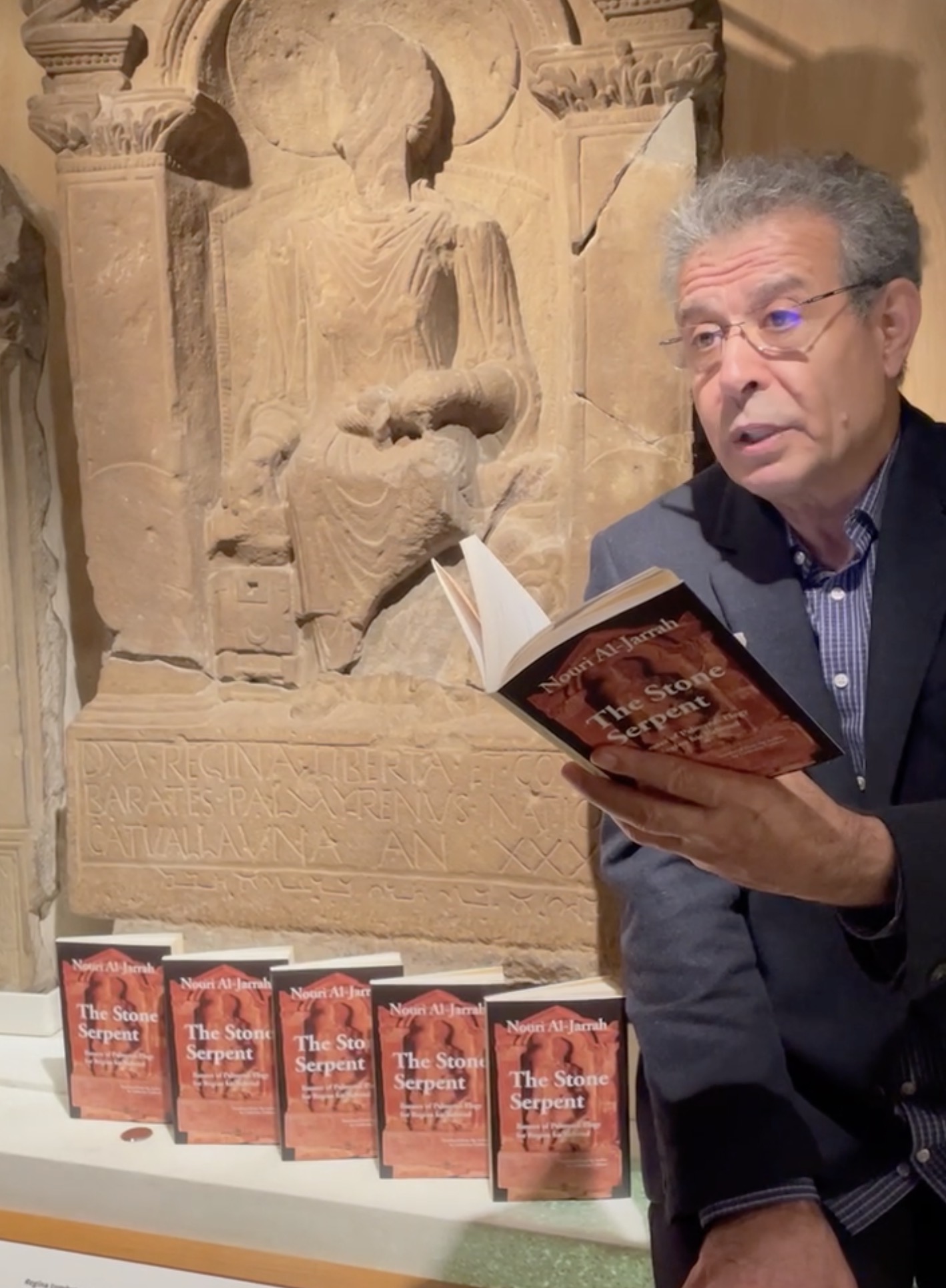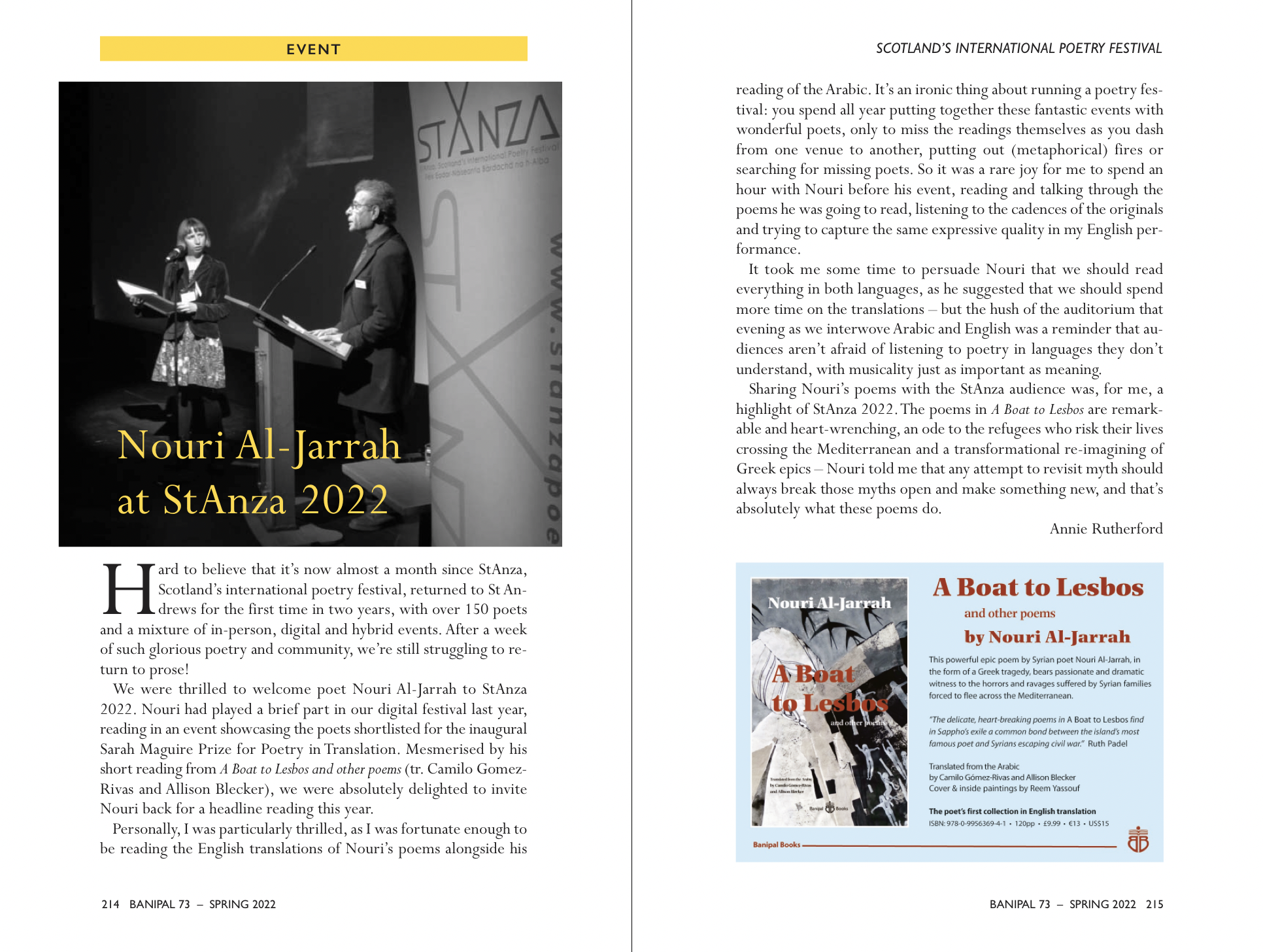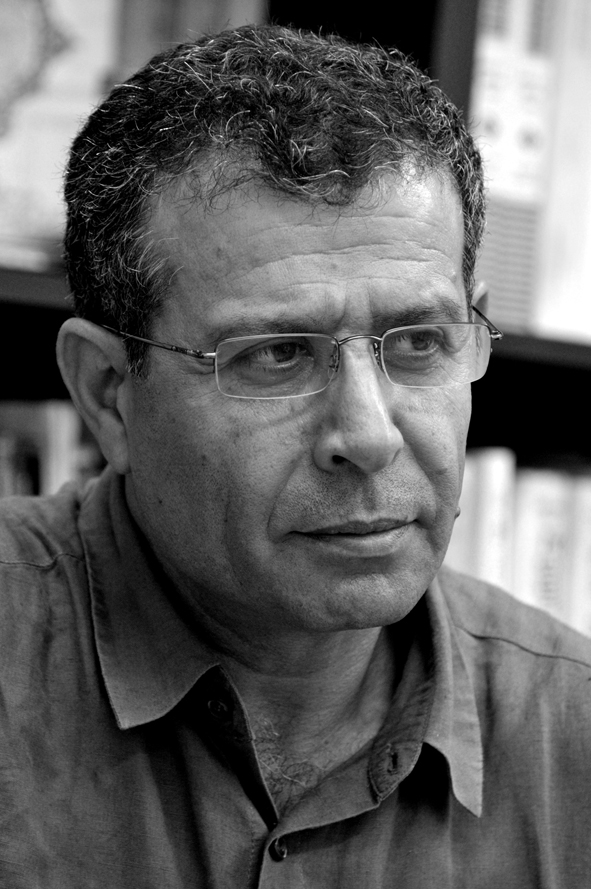Receive Our Newsletter
For news of readings, events and new titles.

Pbk • eBook • 112pp
Available to order online, from any good bookshop
or direct below from Banipal Books
Ebook and Kindle available from Amazon.co.uk and from Amazon.com
by Nouri al-Jarrah
Translated from the Arabic by Catherine Cobham

Photo: Nouri Al-Jarrah reading beside the tombstone of Regina at Fort Arbeia in South Shields on publication day, 12 October 2022
Syrian poet Nouri al-Jarrah brings to life a story that can never again be lost in time after a single line in Aramaic on a tombstone fired his imagination. This inspiring epic poem awakens two extraordinary lovers, Barates, a Syrian from Palmyra, and Regina, the Celtic slave he freed and married, from where they have lain at rest beside Hadrian’s Wall for eighteen centuries, and tells their unique story. Barates’ elegy to his beloved wife, who died young at 30, is, however, not about mythologising history.
With the poet himself an exile in Britain for nearly 40 years from his birthplace of Damascus, the poem forges new connections with today, linking al-Jarrah’s personal journey with that of his ancient forebear Barates, who resisted slavery with love.
Barates’ Eastern Serenade also questions whether the young Celtic fighters, the Tattooed Ones, were really barbarians, as they emerged from forest mists to defend their hills and rivers and their way of life from the Romans, and died or lay wounded at the twisting stone serpent that was Hadrian’s Wall.

In this episode of Mary Beard's series BEING ROMAN, she looks at "Love in the Borderlands", talking with Nouri Al-Jarrah, with Samira Kawar interpreting, about his book on the love story of Barates, the Syrian from Palymra and his love, Regina,
The programme describes the episode as follows: On Hadrian’s Wall a slave girl from Hertfordshire and a lonely traveller from Syria meet and marry. Their story inspires poets and artists, but is this true love or exploitation?
Nouri Al-Jarrah and Annie Rutherford at St Anza Poetry Festival in 2022.
Photo © Amanda MacEachen
Annie Rutherford, programme co-ordinator for the Festival, wrote about Nouri's appearance at St Anza's for Banipal 73, Spring 2022:
Hard to believe that it’s now almost a month since StAnza, Scotland’s international poetry festival, returned to St Andrews for the first time in two years, with over 150 poets and a mixture of in-person, digital and hybrid events. After a week of such glorious poetry and community, we’re still struggling to return to prose!
We were thrilled to welcome poet Nouri Al-Jarrah to StAnza 2022. Nouri had played a brief part in our digital festival last year, reading in an event showcasing the poets shortlisted for the inaugural Sarah Maguire Prize for Poetry in Translation. Mesmerised by his short reading from A Boat to Lesbos and other poems (tr. Camilo Gomez-Rivas and Allison Blecker), we were absolutely delighted to invite Nouri back for a headline reading this year.
 Personally, I was particularly thrilled, as I was fortunate enough to be reading the English translations of Nouri’s poems alongside his reading of the Arabic. It’s an ironic thing about running a poetry festival: you spend all year putting together these fantastic events with wonderful poets, only to miss the readings themselves as you dash from one venue to another, putting out (metaphorical) fires or searching for missing poets.
Personally, I was particularly thrilled, as I was fortunate enough to be reading the English translations of Nouri’s poems alongside his reading of the Arabic. It’s an ironic thing about running a poetry festival: you spend all year putting together these fantastic events with wonderful poets, only to miss the readings themselves as you dash from one venue to another, putting out (metaphorical) fires or searching for missing poets.
So it was a rare joy for me to spend an hour with Nouri before his event, reading and talking through the poems he was going to read, listening to the cadences of the originals and trying to capture the same expressive quality in my English performance. It took me some time to persuade Nouri that we should read everything in both languages, as he suggested that we should spend more time on the translations – but the hush of the auditorium that evening as we interwove Arabic and English was a reminder that audiences aren’t afraid of listening to poetry in languages they don’t understand, with musicality just as important as meaning.
Sharing Nouri’s poems with the StAnza audience was, for me, a highlight of StAnza 2022. The poems in A Boat to Lesbos are remarkable and heart-wrenching, an ode to the refugees who risk their lives crossing the Mediterranean and a transformational re-imagining of Greek epics – Nouri told me that any attempt to revisit myth should always break those myths open and make something new, and that’s absolutely what these poems do.
*
After translating the poems Catherine Cobham wrote:
"These poems say so much in such concentrated lyrical ways about exile, empire, migration, borders – not to mention the visceral evocation of northern English weather."
While Nouri Al-Jarrah has commented:
“Mythologies can no longer be reproduced as they are without a reinterpretation. The poet must range between the epic text, in its own time, and today”
Professor of Arabic at Rome's LUISS Guido Carli Francesca Maria Corrao writes:
“Nouri Al-Jarrah is not an antihero but a modern hero representative of a new generation in search of space to create a future in a world filled with the overwhelming presence of the fathers”
And writing about an earlier collection, Abdo Wazen, cultural editor of Independent Arabia says:
"Nouri Jarrah’s poem, A Boat to Lesbos, immediately found its place at the vanguard of the tragic poetry that has been written within Syria, in the Syrian exile and in the Arab world. The work has become part of world poetry, not just through the medium of translation but through its poetic lexicon, which fuses the universal, as expressed through the legacy of ancient Greece, with the Syrian and Arab dimension."

Nouri al-Jarrah was born in Damascus in 1956. He attracted attention with his debut collection of poems, The Boy, published in Beirut in 1982 and has become an influential poetic voice on the Arab literary scene. Since 1986 he has lived in London, publishing 16 further collections, and founding and editing a number of Arabic literary magazines. His poetry draws on diverse cultural sources, and is marked by a special focus on mythology, folk tales and legends. Selected poems have been translated into a number of Asian and European languages. A Boat to Lesbos and other Poems (Banipal Books, 2018) was his first collection in English translation, joining the original Arabic book’s translations into French, Spanish, Turkish, Italian, Greek and Farsi.
In June 2023 Nouri Al-Jarrah was awarded the 2023 French Max Jacob Poetry Prize for his collection in French translation entitled Le Sourire du dormeur (Actes Sud / Sindbad), translated from the original Arabic by Antoine Jockey. The annual Le prix Max Jacob was founded in 1951 by the Association des Amis de Max Jacob to award a a French work of poetry, and since 2004 also a published collection of poetry in French translation from any other language.
More about Nouri Al-Jarrah here and here
Translator Catherine Cobham taught Arabic language and literature at the University of St Andrews, Scotland, for many years, and has translated works of a number of Arab writers, including poetry by Adonis, Mahmoud Darwish, Ghayath Almadhoun and Tammam Hunaidy, and novels and short stories by Naguib Mahfouz, Yusuf Idris, Hanan al-Shaykh and Fuad al-Takarli.
Click to download the Press Announcement
Nouri Al-Jarrah examining the tombstone of Regina at the Roman Fort Arbeia in South Shields
The Stone Serpent is published during the year-long cultural project, the 1900 Hadrian's Wall Festival.
We are pleased to have the book listed as one of the Festival's activities, along with Nouri Al-Jarrah's participation
with The Stone Serpent at Banipal's Celebration of 25 years publishing Arab literature in English translation
on 30 November at the Lit & Phil Library in Newcastle